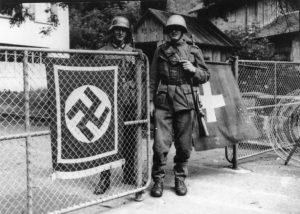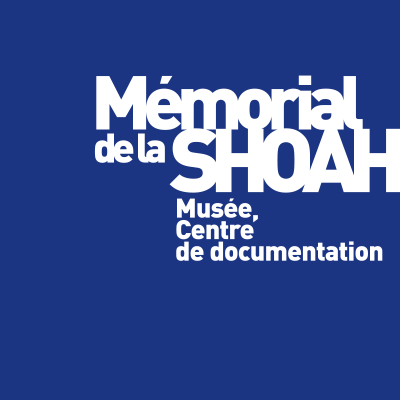Switzerland in the face of genocide. New research and perspectives As part of Switzerland’s chairmanship of the International Holocaust Remembrance Alliance
Sunday, February 04, 2018 at 9:30 AM
During the Second World War, Switzerland is the neutral power whose geostrategic position is the most threatened, landlocked in the heart of German Europe from November 1942. What were the asylum policies conducted by Switzerland with regard to persecuted Jews, from the beginning of Nazism until 1942, then from 1942 until the end of the war? Has Switzerland been a place of refuge? As part of this conference, historians specializing in these questions will share with us their latest work on the attitude of Switzerland towards persecution and the Holocaust.

German and Swiss soldiers on the German-Swiss border, 1940. Memorial of the Shoah/coll. Museum of the citadel resistance in Besançon.
9 h 30 Opening
10 h Switzerland and the Third Reich
Presidency: Mauro Cerutti, professor emeritus, University of Geneva
Diplomatic, military, economic and financial stakes
Thomas Maissen, professor, university of Heidelberg, director, German historical institute, Paris
Restitution and discussions on dormant accounts in the post-war period
Jakob Tanner, professor emeritus, University of Zurich
Switzerland’s information platform on persecution and genocide, and Jewish organizations
Jacques Picard, professor emeritus, university of Basel
Official research on Switzerland and the Second World War: from the Ludwig report (1957) to the Bergier report (2002)
François Wisard, historian, historical service, federal department of foreign affairs
11:30 The passage to Switzerland. 1933-1945
Presidency: Renée Poznanski, Ben-Gurion University, Israel
The refoulement of Jewish refugees at the Swiss border
Serge Klarsfeld, historian
The report of the Bergier commission on refugees. Introduction
Marc Perrenoud, historian
The passage from France to Switzerland
Ruth Fivaz-Silbermann, historian
The passage from Italy to Switzerland
Fabrizio Panzera, State Archives, canton of Ticino
The influx of Jewish refugees from Italy to Switzerland during the Second World War. Quantitative aspects and case study: the Caprino border guard post.
Adriano Bazzocco, historian
The passage from Germany to Switzerland
Guido Koller, historian
15h Actions and inaction: the Swiss abroad and foreigners in Switzerland
Presidency: André Kaspi, professor emeritus of universities
The silence of the International Committee of the Red Cross (ICRC) in the face of deportations
Daniel Palmieri, in charge of historical research, ICRC, Geneva
The Swiss Red Cross – Aid to children. The great figures of the Righteous and rescue
Helena Kanyar-Becker, historian
The allied intelligence services in Switzerland
Christian Rossé, historian
Foreign diplomats in Switzerland and false documents
Jakub Kumoch, Ambassador of Poland to Switzerland and Markus Blechner, honorary consul of Poland in Switzerland
17 h History and memory of Switzerland during the Second World War
Presidency: Denis Peschanski, research director, CNRS
The places of memory of the Holocaust in Switzerland
Fabienne Meyer, historian
Challenges for education and memory in a neutral country and a context of diversity
Monique Eckmann, professor emeritus, University of Applied Sciences and Arts of Western Switzerland, Geneva
History and memory of Switzerland in the face of the Holocaust. General conclusion
Georg Kreis, professor emeritus, University of Basel
Mauro Cerutti, professor emeritus, University of Geneva
Programme subject to change.
Attention, this event being full the remaining places are in the retransmission room.
Free entry on reservation for half a day
International symposium organized by the Shoah Memorial in the framework of the Swiss presidency of the IHRA
Scientific Direction:
Francois Wisard, historian, Historical Service, Federal Department of Foreign Affairs
Ruth Fivaz-Silbermann, historian
Pauline Dubuisson, Shoah Memorial
Sophie Nagiscarde, Shoah Memorial
General coordination:
Pauline Dubuisson, assisted by Marine Lesage, Shoah Memorial
Communication:
Flavie Bitan, Claire Jeandel, Iris Delaunay, Shoah Memorial
Thanks:
Claude Singer, Edmond Richemond, Georges Bensoussan, Bruno Boyer, Thomas Maissen (IHA), Bernard Favre, Claire Luchetta, Frédéric Maire (Cinémathèque Suisse), Liliane Salama, Livia Parnes.

